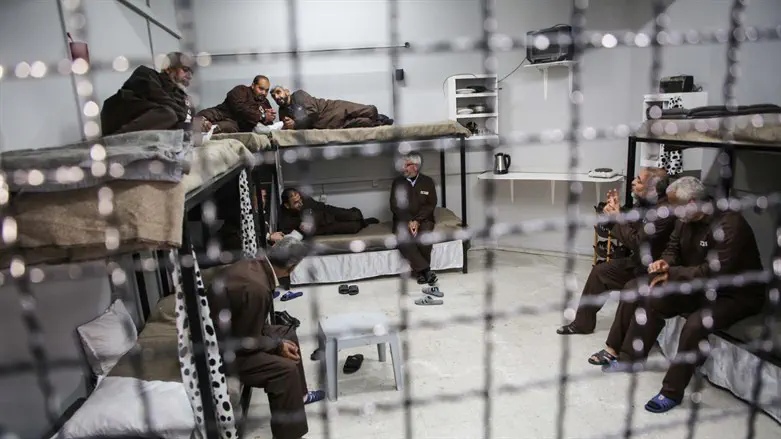
Negotiations between the Israeli Prisons Service and the representatives of Palestinian Arab terrorists, also known as "security prisoners," have been ongoing since early Friday morning after they announced that approximately 1000 of them would start a hunger strike to protest what they call "aggressive steps" that are being taken against them, Israel Hayom reported.
A source in the prisoners' organization told Israel Hayom that the sides have yet to come to a final agreement, but there is a positive atmosphere, and he hopes to reach a compromise in the coming hours. "There is tension, but at the same time, there is also talk about how to solve this crisis. I think that it is possible to come to an understanding with the prisoners, All in all, they don't have any new demands, they just ask to restore the situation to as it was and to stop the provocations and the punitive actions which don't contribute to anyone, not even to Israel's security," he said.
He added that if an agreement is reached, the 1000 prisoners who announced the hunger strike and whose names were submitted to the Prisons Service would agree to suspend the strike.
According to him, the prisoners are not demanding any new conditions and are willing to cooperate with the security inspections that the wardens carry out but demand they be carried out "in an orderly fashion that is based on mutual respect and is not demeaning." An additional demand is "to return the prisoners who were removed from their wings, as quickly as possible, to their cells." He stated that the prisoners who were caught with smuggled cellphones in their cells "understand that they will be punished but demand that the punishment be reasonable and not provocative."
"You can't decide to suddenly force new rules on the prisoners and change their conditions and the status quo that was until now," he said and added, "If the negotiations fall apart, they will begin to strike."
Earlier this week, National Security Minister Itamar Ben-Gvir visited the Ofer prison, where he received an overview of the prison and toured the various wings of the prison, where terrorists from Hamas, Fatah, the PFLP, and Islamic Jihad are imprisoned. In addition, the minister met for a conversation with the wardens serving at the prison.
"The policy that I lead as the minister in charge of the IPS e is known to everyone, and I'm glad that it has started to be implemented - to reduce as much as possible the pampering Hamas terrorists and to end the summer camp that existed in the prison wings in the past. During the tour, I made this clear again to the commanders in the field," the Minister stated following the visit.
In an interview with the Al-Arabi Al-Jadid newspaper, Karim Younes, terrorist murderer released after 40 years in prison said., "We turned the jails into colleges and universities." Israel's prisons offer academic studies for the inmates, and during his imprisonment, Younes even published two books, "The Political Situation in Israel" and "The Ideological Struggle and Arrangement."
Younes said that Marwan Barghouthi, who is considered a leader of the first and second intifadas and is serving time the murder of Israelis, "Was our teacher when we were learning for our master's degree" and that he himself would lecture the prisoners about political science until the final year of his sentence.
Media images in the past showed imprisoned terrorists openly mocking Israel while sitting around tables laden with sumptuous food, watching satellite television and speaking on forbidden cell phones that were smuggled in to them. Minister Ben Gvir pledged to change that and has taken steps to do so.
